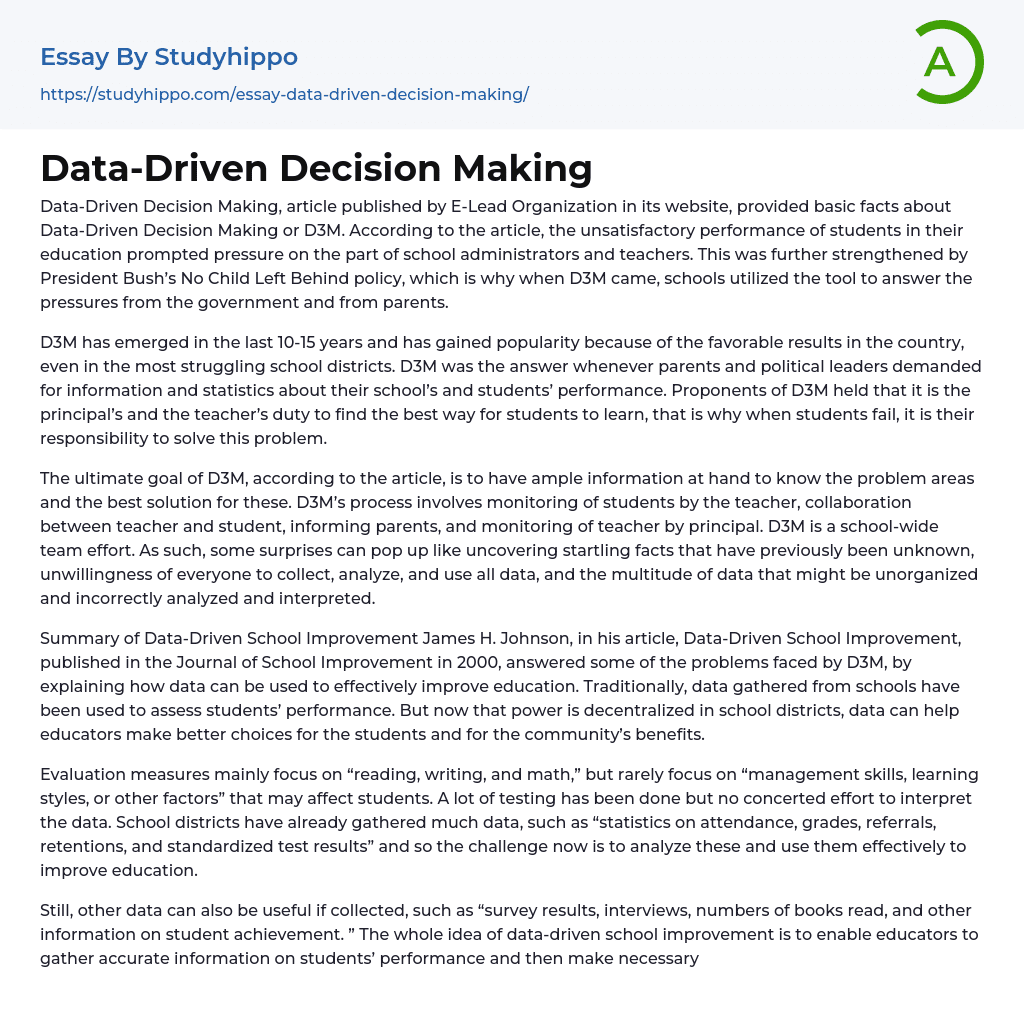The website article "Data-Driven Decision Making" by E-Lead Organization discusses the topic of Data-Driven Decision Making (D3M) and its relevance. The article highlights that schools faced difficulties with students' underperformance and had to contend with pressures from school administrators, teachers, and President Bush's No Child Left Behind policy. To tackle these challenges, D3M was implemented as a solution. This approach was seen as a way for schools to meet government expectations and address parental concerns.
D3M has gained popularity in the past decade, even in struggling school districts, because of its positive outcomes. It is often used by parents and politicians to obtain information and data on their schools' and students' achievements. Supporters of D3M believe that principals and teachers have a responsibility to find the most effective teaching methods for students. Therefore, if students fail, it is up to them to address t
...he issue.
According to the article, D3M aims to collect sufficient information for identifying problem areas and finding effective solutions. Various methods are used by D3M, including teacher monitoring of students, collaboration between teachers and students, informing parents, and the principal's monitoring of teachers. This collaborative effort involves the entire school community. Consequently, there may be unexpected challenges such as discovering previously unknown and surprising facts, individuals being reluctant to collect, analyze, and utilize all available data, and managing a large amount of disorganized and poorly analyzed data.
In his 2000 article titled Data-Driven School Improvement, James H. Johnson explores the utilization of data to enhance education. Traditionally, school data was mainly employed for assessing students' achievements. However, as decision-making authority is now dispersed within school districts,
data has the potential to aid educators in making more informed choices that positively impact students and the community.
The main focus of evaluation measures revolves around "reading, writing, and math," with little consideration for factors such as "management skills, learning styles, or other factors" that may affect students. Despite conducting extensive tests, there has been a lack of collaborative effort in interpreting the gathered data. School districts have already accumulated a wealth of data including attendance records, grades, referrals, retentions, and standardized test results. Consequently, the current obstacle lies in effectively analyzing and utilizing this data to improve education.
Gathering different forms of data, including survey responses, interviews, book reading records, and student achievement data, can benefit schools by improving them. The objective of using data to drive school improvement is to offer educators precise information about students' progress so that they can make necessary modifications to teaching methods or curriculum for improved education. Involving teachers in the research process is one approach to accomplish this goal.
Teachers will conduct small-scale studies in their own classrooms to assess the effectiveness of various methods. Although this approach allows for close observation of classroom dynamics, it may be less objective than large-scale academic research due to the teachers' personal connections with the subject matter. Nonetheless, gathering data will help educators evaluate how interdisciplinary teaching positively impacts both remedial students and high achievers.
Data fulfills two functions: evaluating students’ performance and implementing corrective measures for low achievers, as well as identifying issues and finding effective solutions. Nevertheless, continuous improvement is necessary as data collection, analysis, and utilization require the collaboration of diverse individuals.
Personally, I support the two articles' viewpoints and affirm the necessity of data for decision-making as it has proven to enhance overall student and school performance.
Although I value the efforts of school administrators and teachers, I do not agree with those who solely blame them for student failures in relation to D3M. It is crucial to understand that both parties share responsibility in this matter – the teachers and principal on one side, and the students on the other. We must acknowledge that students possess diverse levels of cognitive development and adopt different learning methods.
While educators have the responsibility of improving students' abilities and intellect, it is also crucial for students to strive for excellence in their classes. This is because their education ultimately benefits them personally. It is important to recognize that numbers and statistics cannot be ignored, but motivating students is not solely the responsibility of educators. Every individual - including the community, political leaders, volunteers, and the students themselves - plays a vital role in ensuring a highly satisfactory education.
The articles emphasize the significance of collaboration and a collective approach. I concur with their perspective that despite accumulating a substantial amount of data, only a fraction has been thoroughly analyzed and utilized. As a result, it is vital for school administrators to meticulously evaluate all the data and determine which ones are applicable to their distinct requirements. This is because D3M lacks standardized regulations or approaches that can be universally implemented by all schools. Alternatively, it is a tailor-made initiative designed to improve education in each specific school.
- Incentive essays
- Project essays
- Library essays
- Listening essays
- Coaching essays
- Learning essays
- Literacy essays
- Teaching essays
- Physical Education essays
- homework essays
- Reading essays
- Research essays
- Critical Thinking essays
- Social Studies essays
- Mentor essays
- Sex Education essays
- Study Plan essays
- Standardized Testing essays
- Interpretation essays
- Plagiarism essays
- Analogy essays
- Learning English essays
- Fun Home essays
- The Raven essays
- Reading Books essays
- Sexual Intercourse essays
- Accident essays
- Awareness essays
- Benefits of Volunteering essays
- Challenges essays
- Childhood Memories essays
- Decision essays
- Driving essays
- Event essays
- Excellence essays
- Expectations essays
- Failure essays
- Farewell essays
- Flight essays
- Gift essays
- Growing Up essays
- Ignorance essays
- Improve essays
- Incident essays
- Knowledge essays
- Luck essays
- Memories essays
- Mistake essays
- Obstacles essays
- Overcoming Challenges essays




